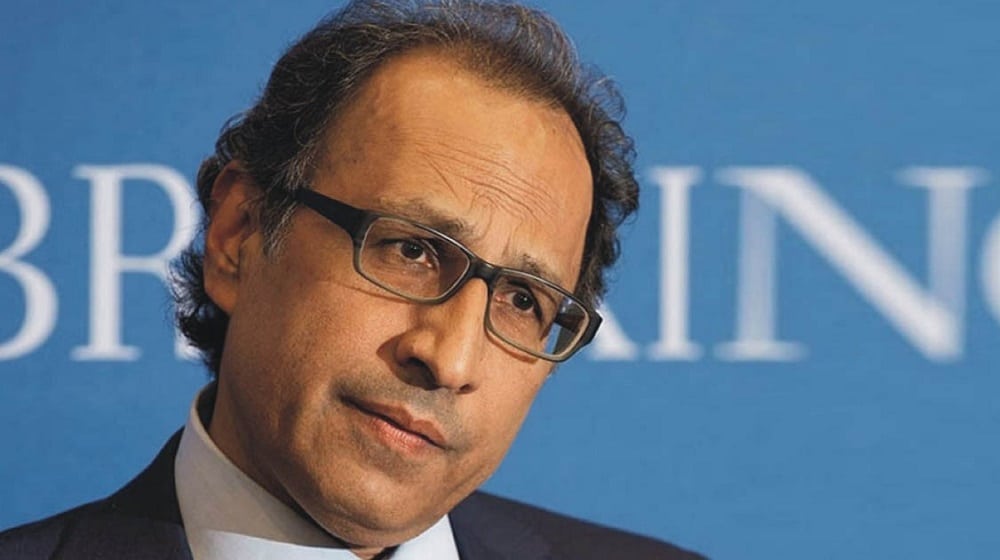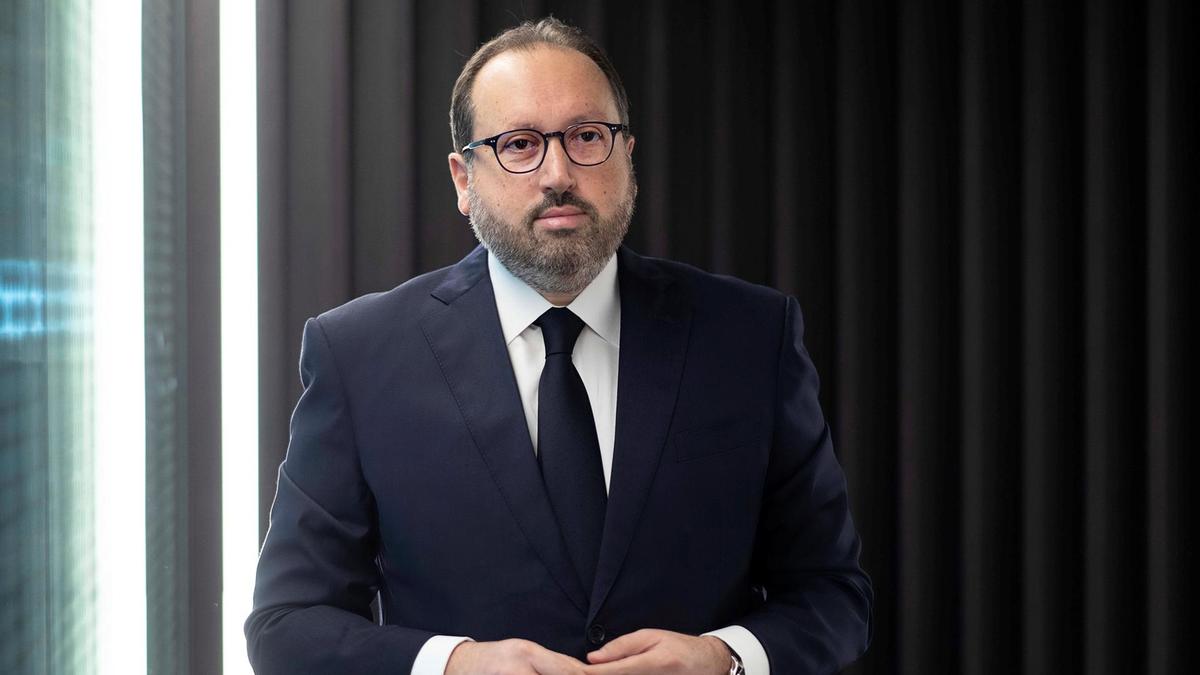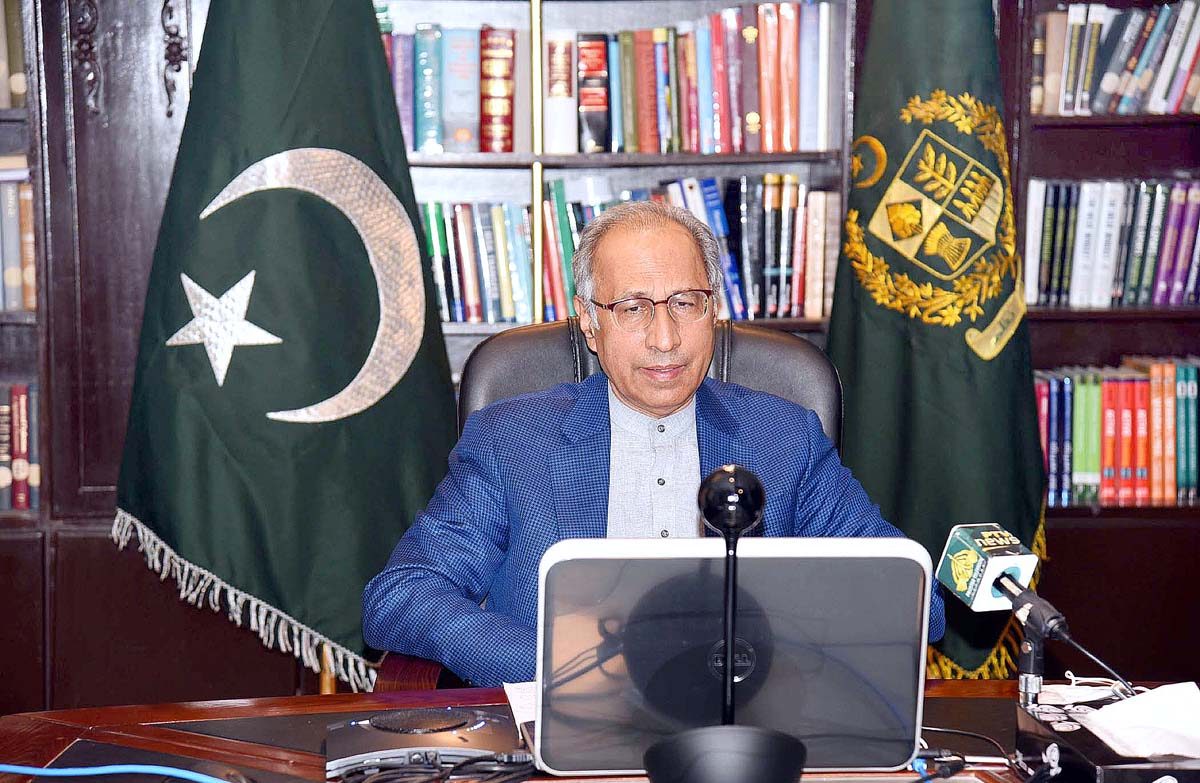I want to start by giving you a background of what we inherited. Obviously, when this government came in, the country was in an economic crisis, as the Prime Minister stated, the current account deficit and well as the fiscal deficit were at their highest levels and there was a massive debt burden that had to be dealt with and there was a serious threat both from the external economic front as well as from the extravagance and bad policies of keeping the exchange rate over-valued and so on. The first step was to secure the economic landscape and try and inject stability into the system. For that we went to the IMF and structured a programme which revolved around three main decisions. The first was to inject discipline in public finances which meant increasing taxes. Before COVID we were getting a 17% increase in taxes. Second was to be a very aggressive expenditure cutting of the government, so we cut down on expenditures of the federal government, the cabinet, the Prime Minister, the President and we even froze the expenditure of the military. The result was that we brought the public finances under control.
We had to fulfill our obligations to meet a component of our debt and for that we gave Rs. 5000 billion in the last two years to be current. The other big decision we took was to allow the exchange rate to be determined by market forces because as we know during the last five years of the previous government the Rupee was artificially over-valued and as a result the growth rate was less than zero percent. So, once we got the exchange rate to be initially devalued and then to find a stable level which it has seen for the last few months, we were able to see some upsurge in exports. What I want to say is just before the corona virus struck us we were taking some tough decisions on expenditure management, no borrowing from the Central Bank, no supplementary grants outside the budget and at the same time we had taken important decisions to bring our current account deficit down from the historically high US$20 billon to less than US$3 billion.
When the corona virus struck us we were affected, especially our daily wage workers, our industry, our retail sector, etc. and we came out with an economic stimulus package, the main point of which was to get liquidity into the hands of both our citizens as well as our businesses so that the problem of liquidity does not degenerate into one of insolvency. For that we put aside a budget of Rs. 1.3 trillion and gave loans for payroll expenses, we deferred principal payments for the businesses for a year, we paid electricity bills for three months for small and medium enterprises and as a result of all that we were able to navigate somewhat better and were ready to seize the opportunity when the economies around us began to pick up. We also gave, as the Prime Minister stated, a historic package of cash transfers to our citizens involving around 16 million people, mostly women-led household families.
Navigating around the corona virus we see some signs emerging in the economy which are positive. First our large-scale manufacturing is showing a growth rate, second our current account deficit and our primary balance are both in surplus a very rare occurrence in Pakistan. And then one sees a pickup in exports, 100% capacity utilisation in sectors like cement, textiles and a real big uptake in sectors like motorbike, fertilizers, tractors, cement and so on. This all means that the real side of the economy is improving, at the same time as your said, we want to really focus on a new way of transforming our economy and I do not want to speak for too long in the introduction but subsequently in the questions session I would like to tell you how we are trying to transform the economy, integrate it globally and take it forward. I do have worries as well and those relate obviously to tackling inflation, especially food related inflation, and second, getting our electricity sector and circular debt under control in the Q&A session. Thank you very much.
First of all let me start by saying that we live in a very difficult neighbourhood and in many ways the sad part of being in South Asia is that somehow the regional dynamics that some of the other areas like ASEAN, EU or even NAFTA have benefitted from, we have been deprived of that. The countries must work on making this a better neighbourhood because the potential is so enormous and our needs are so large so I think we need to benefit from that.
In terms of how I see the region, I think that as the devastating impact of the corona virus begins to recede we see that Pakistan has a tremendous potential and that can be utilized with support from the arrival of peace and better security in Afghanistan, the opening of the links to Central Asia, the port that we are setting up in Gwadar which will help in developing direct links with western China that will also reduce the cost of doing business for China and help them develop this part of their country. At the same time, it will help them reduce the cost of transmitting fuel and energy supplies from the Middle East towards China. With Gwadar port trade with Africa will become easier. So, I think there is a lot of potential there. More importantly what we are doing is to transform the country and the focus we are keeping upon remedying some of the deficiencies of the past. If you are a student of Pakistan and you look at how the future will look, I think you can see why Pakistan has not done so well in the past. I feel that there have been periods in our history that we have achieved growth rates which are very impressive but the problem has been that growth spurts have not been sustained. So the challenge that the leadership of this government needs to take on is to overcome the reasons which prevented these growth spurts from becoming long term trends. I believe these growth spurts failed to be sustained because of three reasons. No.1 that we have too much government in too many spheres of our economy and we need to tackle that which we are doing now. Secondly, we have not done a good job in partnering or making alliances with the rest of the world and this is an area our business sector has to really come to terms with and deliver because if we cannot export, if we cannot find a way to sell our products and if we cannot attract foreign investment to our country, there is no way to have sustainable development. Nobody has done it alone and we have done a pretty bad job of making alliances and partnering with the rest of the world. That is why our focus now is to try and give incentives to exports, we are giving gas subsidies, electricity subsidies and even loan subsidies to try and promote exports. At the same time, we have a very liberal foreign investment regime and we are trying to make it easy to do business here and we are encouraging our private sector to partner, as Mr. Hussain Dawood and others like him have done, with global players to have them come and play their part. The third very important reason has been that we have not had the institutions that have sustained this kind of dramatic twists and turns that have taken place in our political scene. So this focus is also there. What we are attempting to do is to build institutions, whether it is the central bank, the security exchange commission, the regulatory authorities, the provincial governments, the civil service, etc. there is now focus on trying to build these institutions to take Pakistan into the kind of future that the people really want and the country deserves.

Thank you, it is always a pleasure interacting with Mr. Ikram Sehgal and whenever we have visited Davos he has been very generous in hosting us and sharing his insight, so it is a pleasure to have the benefit of the friendship of both Mr. Hussain Dawood and Mr. Ikram Sehgal in particular who, in the context of the WEF, has been a guide and a source of good advice. I thank him for that. The question he has asked can be broken up into two parts, one is that because I have had the opportunity and good fortune to have worked in 20 plus countries, how do I see, as a student of development, what Pakistan needs? If you look at the countries that got ahead and the countries that were left behind, I think three things separate the countries that got ahead. First is that they focused on their people, you can’t have developed countries without developed people and this is a very important lesson for us and something we need to keep in mind when shaping our policies for the future. The second is that the countries that relied upon the private sector and struck a good balance between public interest and as well as private initiative got ahead and those that relied on excessive government both in manufacturing, ownership, management of large chunks of the economy were left behind. The third is that nobody as I mentioned earlier can do it alone, and therefore countries found a way to sell their products to others and were able to attract international capital which runs into the trillions were able to get ahead. So these are three of the areas which I think should help us in moving forward. In terms of my experience here in the country and how this government and this period is different, let me say that this government is different in a way because its leadership projects an image of integrity and I think that how perceptions and expectations are formed about governments is sometimes as important as real policies. So this government is projecting an image of integrity and that is very important especially when an investor can come here without any feeling that somehow there will be some kind of extortion or an uneven playing field or that vested interests will create barriers and so on. So in that way this is a very transparent government in my international experience also, and I say this not because I am part of this government but as a neutral observer, that I think it injects a level of transparency on the conduct of government affairs that is somewhat rare in developing countries. Another way this government is different is that it is not personality-driven or family-driven but rather it is trying to develop a broader coalition and the private sector is at the heart of that, so all the incentives are geared towards the private sector, there are no families or conglomerates that need to be protected or given special incentives, this is a completely level playing field and the Prime Minister and senior ministers are accessible to the private sector who want to genuinely solve the problems. I think the decisions are made always on merit and we are struggling to ensure this perception gets through and that is why we are trying to automate the Federal Board of Revenue to ensure that people feel there isn’t any harassment from tax authorities. We are trying to inject professionalism into regulatory bodies so they are not heavy-handed or use pretexts of protecting public interests thereby blocking growth of genuine economic potential.
As far as the final point you made, Sehgal Sahib, about sub-national governments or the provincial governments, I believe that in the future model (and also going back to Oliver’s question about how I see the future) it is critical that the sub-national governments’ or the local governments’ role is acknowledged and even the communities’ role in addition to the state Vs the private sector needs to be acknowledged. The things that fundamentally matter to the people, like basic education, basic health, drinking water, sanitation, municipal services, small courts, gender improvement, child nutrition, etc. all those things that fundamentally affect the way of life, are within the domain of the provincial governments. So until and unless we try and have a full government approach to solving people’s problems and altering the quality of life, it is very important that their ways of doing business, their cost of doing business and the openness that they feel for the private sector, which the federal government feels should also get reflected. I think you have raised a very important point here and I can reinforce it. I am not simply saying it, but we are effectively trying to implement these as part of government policy. We welcome you and our other colleagues who are here and wish to make an impact through the injection of new technologies.
I would also like to take the opportunity to react to the question from the colleague from Telenor which have played a big part in improving the quality of business as well as reducing the cost of business in the Telecom sector which has been a huge success story for Pakistan. We appreciate Telenor’s commitment and I want to say that there are three issues in our dealing with Telenor and other colleagues in that sector. The first is license renewal, this matter is in the courts, but we are having separate negotiations with our colleagues in the telecom sector and I think those are making very good progress. Secondly, we would like some tax breaks especially on the withholding tax and we have prepared a summary. I think those decisions made in the context of the new budget for which preparations will really commence in the next two months or so I can assure my colleague that some good news will be there for him. The third is that we are trying to offer a new spectrum through an open and transparent auction and we are very excited that Telenor would be a participant in that and if there is any way we can facilitate further this commitment to our country we will be happy to do that.
There was a question by my colleague Mr. Rishi Kapoor on the role of private equity and I want to say that at one time I also dabbled a bit in private equity. What has been proven very hard in South Asia is that exits have proven very hard, not just in Pakistan but even in other countries in this region, so that is a challenge of how to try and exit after investing in the companies especially if you have large stakes. The second point is that sometimes remitting profits in big amount is also a problem due to foreign exchange constraints of the Central Banks but we have taken steps on trying to make it easier and make at least the repatriation of profits effortless. But we can work together and try and create better environment for private equity firms to be motivated to participate in our economy.

Also in terms of Mr. Alain Bejjani’s views on the retail sector and in view of the fact that he will be approaching us with some proposals we will welcome him and roll out the red carpet for him.
I would like to conclude by saying that the people of Pakistan are at the heart of whatever we are doing. The things that matter are those that will alter the lives of the citizens of Pakistan, particularly those who have been forgotten in the past. Where we try to spend our money, apart from giving incentives and subsidies to the business sector, is on the people of Pakistan who are in a desperate situation and that is why our Social Safety Net Program, recognized globally, has been transparent with the desire to give money to the people, especially into the hands of women and households led by women and that is why our cash transfer programme benefitted 16 million people.
The last point I want to make is we recognize the centrality of the private sector and of the international business community in helping us transform our economy. The final point I want to make is that growth in terms of GDP and so on is important but we have had episodes in our history where these growth spurts have not reached everyone so we want to ensure that while we have growth, we preserve the quality of that growth as well and that it reaches the people who really aspire for it. When we go forward and begin to achieve the trajectory of growth that we feel confident with we will ensure that it is inclusive and it reaches all regions and all people irrespective of where they have been in the past. We would like to achieve that and fulfill Pakistan’s destiny.
Thank you.




